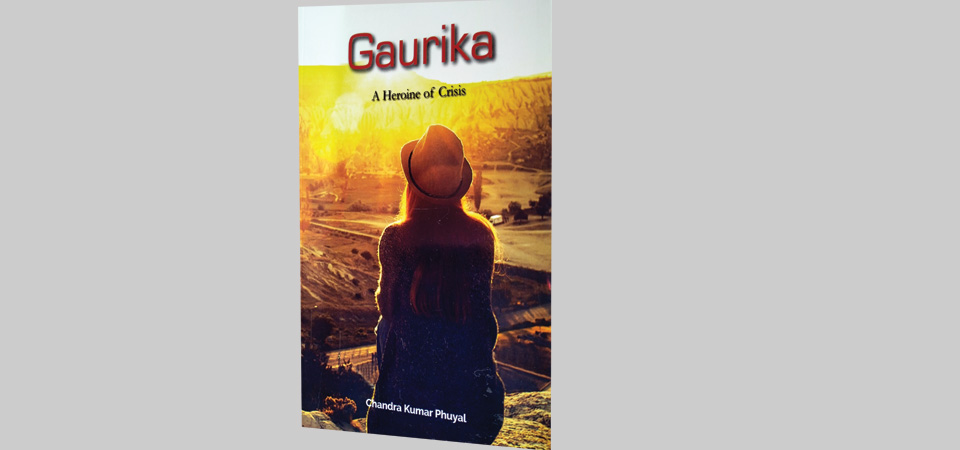Gaurika: A Realistic Novel

Gandhi Raj Kafle
To give artistic words to describe life's story is an unending attempt for literateurs. Litterateurs are creators, and it is they who determine how artistically descriptive or conclusive their stories will be. In this context, we have a 136-page English novella written by Chandra Kumar Phuyal.
Novelist Phuyal, who hails from the scenic area of Chainpur in Sankhuwasabha, has an academic background in teaching and writing in English. Therefore, it is reasonable for him to choose an English medium to write a story about his homeland of Chainpur of Sankhuwasabha district.
This is prominently a story of a migrant Nepali worker. The migrant worker is a dominant theme in our country and there are both happy and painful stories to tell about them for readers.
They comparatively earn more, bring back money for the family and the nation gets remittance from them; it has been directly or indirectly perceived as a happy story. The mistreatment, which they tolerate right before they depart from the unregulated manpower companies here in their home country and their work in foreign countries, however, is a painful story. So, Gaurika, a fictional name of the female protagonist in this novel, can be taken as a representative character of many such stories of Nepali migrant workers.
The novel is made with few characters. Gaurav is the husband of Gaurika. He is a simple, honest, hard-working and generous person. Ajesh, who deceives Gaurika, is a bad character. The space, which the novelist has provided to describe characters like Krishna-Radhika and Harka Bahadur, is appropriately in line with the demands of the story.
This novel involves two generations and the motto in it is only one – hard and sincere work for a decent life. But poverty is an all-time culprit; the helpless situation created by it in the story even claims the life of Gaurav's father Krishna in the absence of treatment of disease in time.
Gaurav fights against poverty with honesty and hard work as his father. He even succeeds in marrying Gaurika, a girl of rich father Harka Bahadur in the village because the love between Gaurav and Gaurika is deep. Gaurav finds no option in the village to make progress for the family. He flew to Dubai, taking out loans and tolerating exploitation from local manpower companies.
Hero Gaurav's dream is strong enough to tolerate pain at the workplace abroad. He even gets a promotion from the company and keeps sending money to his beloved wife and family.
In prime-time, Ajesh comes and Gaurav's beloved Gaurika falls prey to his attractive tricks and untrue love. She elopes with Ajesh and vanishes from the village giving enormous troubles and worry to the family. She also ruined the money sent by Gaurav. But it takes no time to realise for eloped Gaurika that she had been deceived by Ajesh when they reached Islam.
In the meantime hero Gaurav comes to the village, Chainpur, from abroad and hearing all the bad news he along with his daughter reaches Ilam in search of Gaurika. He gets her when she was preparing to commit suicide for all the sinful acts she did betraying her beloved husband who had done so much to send money for her happiness braving the fifty-degree centigrade temperature of the Arab World.
Little suspense is here because Gaurika's depression is deep and readers of this novel may naturally become grave about the possibility of her decision to commit suicide. But author Phuyal fills the story with a description of qualities like magnanimity, compassion, forgiveness, love and family values of the main hero Gaurav. He rescues his sinking family life forgiving the grave mistake committed by his wife. His innocent little daughter's motherly love has also been described nicely in this novel.
Cases of infidelity and betrayal among the wives of migrant Nepali workers cannot be overruled. So, this is a realistic novel. But what should also be realised is that this is not everybody's case. Therefore, the realisation of mistakes, a better understanding of problems, magnanimity, forgiveness and love lift life. The author is attentive to describe these virtues in this novel.
The moral of the story is, how big is the mistake in life, one should not repeat it and if better understanding is maintained, life can make up for the tarnished image of the past. The saying in the end page of this novel, where the author writes on behalf of Gaurika, "Even the pious Moon contains a black-spot on it. I am just an ordinary woman. To err is human, but repetition of it is demonic and forgiveness is divine", better explains the value of life.
Recent News

Do not make expressions casting dout on election: EC
14 Apr, 2022
CM Bhatta says may New Year 2079 BS inspire positive thinking
14 Apr, 2022
Three new cases, 44 recoveries in 24 hours
14 Apr, 2022
689 climbers of 84 teams so far acquire permits for climbing various peaks this spring season
14 Apr, 2022
How the rising cost of living crisis is impacting Nepal
14 Apr, 2022
US military confirms an interstellar meteor collided with Earth
14 Apr, 2022
Valneva Covid vaccine approved for use in UK
14 Apr, 2022
Chair Prachanda highlights need of unity among Maoist, Communist forces
14 Apr, 2022
Ranbir Kapoor and Alia Bhatt: Bollywood toasts star couple on wedding
14 Apr, 2022
President Bhandari confers decorations (Photo Feature)
14 Apr, 2022










